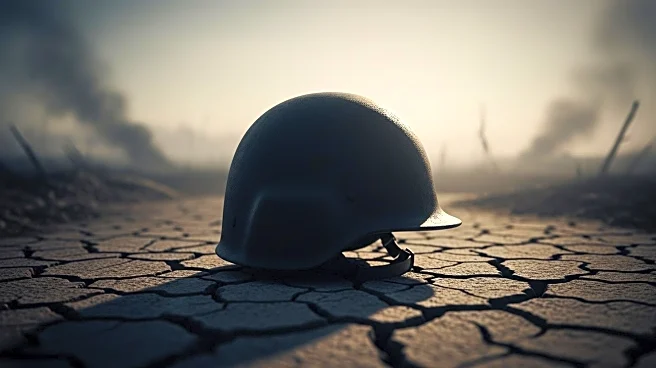What's Happening?
The Russian military has experienced a significant increase in casualties during the ongoing conflict in Ukraine. Reports indicate that at least 93,000 Russian military personnel died in 2024, nearly double the number from 2023. The Institute for the Study of War (ISW) notes that the Kremlin is intensifying its informational efforts to deter Western support for Ukraine and undermine European participation in the peace process. Russian officials have been accused of exaggerating battlefield successes, with claims of territorial gains being criticized by Russian milbloggers. The Kremlin's efforts are seen as a response to the slow and limited territorial gains relative to the high losses incurred. The Ukrainian General Staff reported that Russian forces suffered 290,000 personnel casualties from January to August 2025, averaging 36,250 casualties per month.
Why It's Important?
The surge in Russian military casualties highlights the ongoing strain on Russia's military resources and the challenges faced in achieving significant territorial gains. This development has implications for the broader geopolitical landscape, as it may influence Western nations' support for Ukraine and their involvement in the peace process. The Kremlin's intensified informational efforts aim to sway Western decision-making and bolster its narrative of inevitable victory. However, the high casualty rates and slow progress may undermine Russia's strategic objectives and impact its military morale. The situation also underscores the human cost of the conflict and the potential for prolonged instability in the region.
What's Next?
The ongoing conflict and high casualty rates may lead to increased pressure on the Kremlin to adjust its military strategy or seek diplomatic solutions. Western nations may continue to evaluate their support for Ukraine, considering the human and economic costs of the conflict. The Kremlin's informational efforts may face scrutiny and resistance from both domestic and international audiences. As the situation evolves, stakeholders will likely monitor developments closely, including potential shifts in military tactics or diplomatic engagements.
Beyond the Headlines
The ethical implications of the high casualty rates and the Kremlin's informational efforts raise questions about the human cost of the conflict and the use of propaganda in warfare. The long-term impact on Russian society, including potential public dissent or calls for accountability, could influence domestic politics. Additionally, the conflict's strain on military resources may affect Russia's ability to engage in other geopolitical pursuits or maintain its influence in the region.










